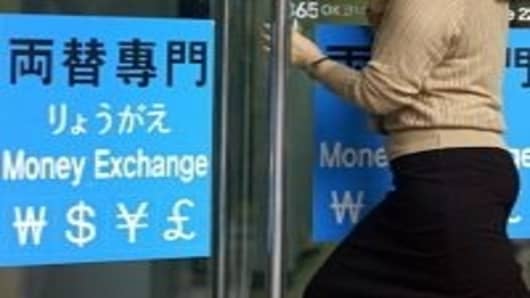South Korea is not immune to the global events that have rocked economies and markets this year, but Asia’s fourth-largest economy is resilient, economists say, and far less vulnerable to the kind of shocks that triggered turmoil for the nation during the Asian financial crisis in 1997.
Since 2000, South Korea has grown far faster than other advanced economies. This is because companies such as Samsung Electronics and Hyundai Motor have gained market share and global prominence, and the government has bolstered its foreign exchange reserves, strengthened the financial system, and boosted government spending at home.
As a result, despite the South Korean economy’s heavy reliance on exports, it can weather the double-whammy of the European sovereign debt crisis and slower growth in China, many economists say.
“(Korea) has a lot of fiscal space to deal with challenges that could arise from the European sovereign banking crisis to stimulate economy, keep growth up, … probably more fiscal space than most other advanced countries,” says Tom Byrne, senior vice president at Moody’s Investors Service.
That’s not to say Korea doesn’t face headwinds. Its economy and markets are considered volatile, or “high-beta” in economic jargon, because of the nation’s dependence on exports, and foreign investors in its markets make it vulnerable to jolts beyond its control.
And signs of inflation are beginning to emerge.
Exports accounted for more than 50 percent of South Korea’s GDP in 2010, according to the World Bank, while foreign investors currently hold about 31 percent of South Korean stocks, economists say.
The pinch from global economic turmoil is already being felt. South Korean exports to Europe fell by nearly 21 percent year over year, while exports to China fell 2.9 percent year over year in April, according to Standard Chartered research. Exports to the U.S., meanwhile, slowed to 4.3 percent in April from nearly 28 percent in March, the firm said.
For the year, Samsung Securities estimates exports will rise only 4.2 percent, after a gain of 19.7 percent in 2011, because demand is falling and average sales price growth for Korean products is fizzling out as banks in the euro zone deleverage.
As a result, economists are easing growth forecasts for South Korea this year. In June, the International Monetary Fundcut its estimatefor South Korea’s GDP growth to 3.25 percent for the second half of this year from its original 3.5 percent estimate.
China’s central bank’s decision in early June to cut benchmark interest rates by 25 points to 6.31 percent, and to cut deposit rates by 25 basis points to 3.25 percent will no doubt benefit Korea, although economists differ on the outcome. HSBC says those benefits may take some time to be realized. But a pickup in China in the second half of this year “should be the source of growth for Korea,” Suktae Oh, regional head of research for Korea at Standard Chartered Bank, said in an email.
But Nick Beecroft, Asia portfolio specialist at T. Rowe Price, cautions that many of Korea’s components shipped to China are made into manufactured goods that are exported to Europe or the U.S.
“So the slowdown in developed market demand will also feed through to slowing exports to China,” Beecroft says.
Korea also is facing some difficulties at home. The nation’s ratio of household debts to GDP was 81 percent in 2010, exceeding the average of 73 percent for members of the Organization for Economic Cooperation and Development, the Korea Chamber of Commerce and Industry reported in June.
“This leaves low-income households particularly vulnerable to shocks in employment which may, in turn, make household debt riskier,” says Ronald Man, an economist at HSBC.
Also, unemployment in Korea, while only 3.2 percent, is chronic and dominated by a growing number of “irregular workers” who are less skilled and have less job security than regular workers, according to HSBC.
Citing the “household debt burden” as well as slowing domestic growth and global economic factors that have been worse than expected, theBank of Korea cut its benchmark interest by 25 basis points to 3 percenton July 12. It was the first rate cut since a 50 basis point cut in February 2009, in the midst of the global financial crisis.
According to HSBC, more than 87 percent of outstanding bank loans to households were linked to floating rates as of May, so the rate cut should have an immediate effect. HSBC expects another 25 basis point cut before the end of the third quarter, as do other economists.
Another reason the bank took action now is inflation in Korea remains low. The nation’s consumer price index (CPI) slipped to 2.2 in June from 2.5 percent in May, below the midpoint of the central bank’s 3 percent inflation target, HSBC said.
Meanwhile, inflation, which has been relatively tame, is starting to bubble beneath the surface, HSBC says.
Still, most Korea observers and economists view the slowdown it is experiencing as a bump in the road, and not of long-term concern.
“As an export country, it’s very hard to escape the global macro issues,” says Michael Oh, portfolio manager of Matthews Korea Investor. “Still, (GDP growth) doesn’t look bad at all when you compare it to other developed countries.” The GDP in the U.S. was running at a 1.9 percent annual rate in the first quarter.
One reason Korea is better positioned to withstand a downturn now than at previous crisis points is that Korean banks have built up an arsenal of foreign exchange reserves since the global financial crisis of 2008 and have increased foreign exchange swap lines with China and Japan.
Higher foreign exchange reserves are good because they “help to mitigate short term liquidity pressures, potentially faced when repaying a large amount of external debt, for example,” says Man.
Korea’s short-term external debts have gone down, but they are still relatively high and could be considered an “Achilles' heel” for the economy, says Moody’s Byrne. That’s because lenders outside of Korea can make funding less available if they get nervous about economic risks.
It was Korea’s heavy reliance on short-term external debt in 1997 that helped trigger the Asian financial crisis, Byrne says. But, he adds, “since ‘97, the Korean banks have been managing this, and in recent years they’ve made progress.”
As a result Korea’s “external vulnerability ratio” — short-term debt coming due and the level of official foreign reserves, has fallen to about 64 percent from nearly 94 percent in 2009 and 290 percent in 1997.
“There’s definitely a vulnerability in a time of global financial market turmoil,” Byrne says. “But the vulnerability has been reduced in the case of Korea.”



